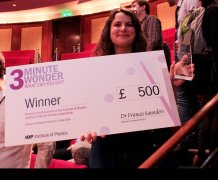Articles

credit: Natalie Garrett
University of Exeter student crowned as ‘3 Minute Wonder’
A University of Exeter student has won a prestigious national competition designed to promote the pioneering work being carried out by early-career scientists to a wider audience.
Hannah Wakeford secured first place in the Institute of Physics’ ‘3 Minute Wonder’ competition, held recently in the Royal Institution’s historic Faraday Theatre in London.
The Astrophysics PhD student beat off stiff competition from thirteen other finalists from across the country, who had to win or come runner-up in their individual regional heats to be able to compete in the grand final.
The competition sees each finalist explain their research to a general audience in no more than three minutes, with Hannah speaking on her work in searching for water in the atmosphere of exoplanets.
Using only soft toys as props, Hannah focused on ‘hot Jupiters’ - giant exoplanets that are similar in size to Jupiter, that orbit so close to their stars that their atmospheres can reach temperatures of 1000-2000 degrees Celsius.
Hannah said: “it was a great evening, every one of the competitors had such presence standing at Faraday’s desk. It was fantastic to get such a response from the judges and the audience.”
The talks were given marks out of 10 by each of the four main judges – author Simon Singh; solar scientist, writer and broadcaster Lucie Green; creative director of TV and science communications company Refinery Productions, Lindsay Keith; and scientist and comic of Festival of the Spoken Nerd fame, Steve Mould.
The contestants then answered brief questions from the audience after their talks, and received immediate feedback from the judges. Hannah received £500 and a ‘3 Minute Wonder’ trophy for winning the competition.
Professor Ken Evans, Dean of the College of Engineering, Mathematics and Physical Sciences said: “This is a magnificent achievement for Hannah, and I congratulate her on her success.
“Being able to explain such high-calibre research not only to her peers, but also to a wider audience, in such a clear, concise and interesting manner is never easy, and requires considerable skill. It is a skill that not all scientists possess and this award is a testament to Hannah’s dedication and hard-work, and is thoroughly deserved."
Date: 21 May 2014
